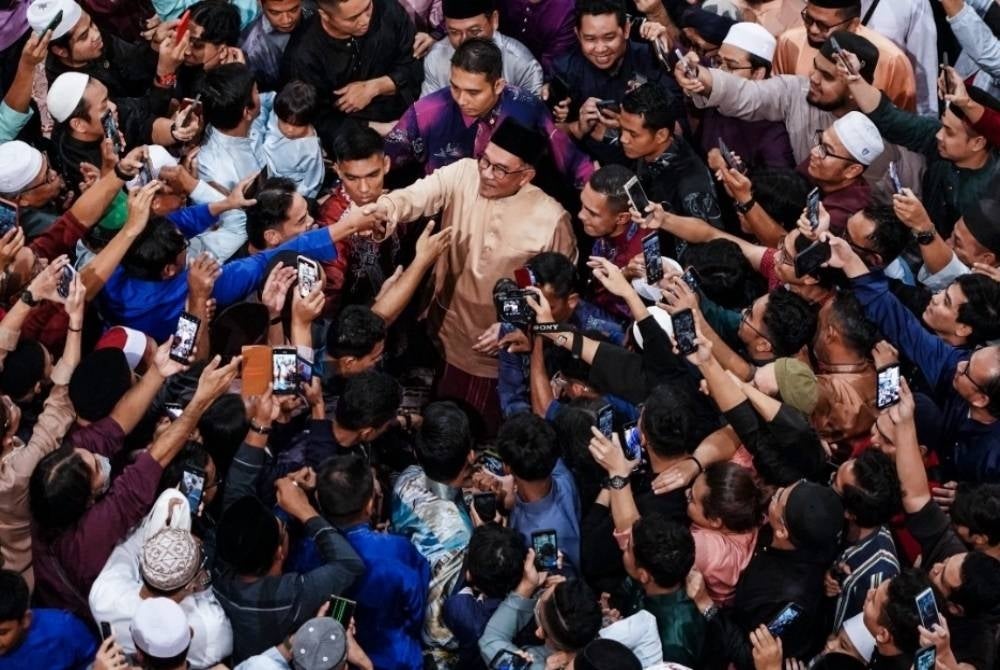Malays' confidence, Anwar's administration's main challenge
SYDI ALIF
SHAH ALAM - Winning the confidence of the Malays is Prime Minister Datuk Seri Anwar Ibrahim's administration's main challenge.
This was unveiled in a survey on the people's sentiments towards the Unity Government's performance following their 100 days in office, which began on Nov 24.
The study involved 35,077 participants from media and news consumers across the country. It was conducted by O2 Malaysia research firm with five mainstream media namely Sinar Harian, Awani, The Star, Sin Chew dan Malaysia Namban for 10 days from Feb 6 to 16.
Over half of the respondents were male Malays from the Peninsular. Notably, most of the respondents were also adults over 40-years old, lived in the West Coast and had a monthly household income less than RM4,500.
Looking at the people's satisfaction towards the government's realisation of its GE15 (15th General Election) manifestos, the Malays easily stood out with 71 per cent of them stating their disatisfaction while the rest of them were split almost evenly in satisfaction and also a neutral stance.
As for Indians, Chinese, Borneo Bumiputera and others, while less than half of each subgroup was satisfied with the achievements, over 50 per cent of them were confident that the government will be able to fulfill their promises within five years. On the other hand, also 71 per cent of Malays felt the opposite.
Besides that, the study also digged into the Malaysians' trust towards a number of government institutions namely police, justice institutions, the Attorney General's Department and the Malaysian Anti-Corruption Commission (MACC) after the Anwar ascended to the premiership.
Overall, the authorities were voted as lacking trust with an average percentage of about 40, followed a little over 30 per cent of those who retained trust in these agencies.
Within the federal government itself, perceptions among its component parties' supporters on the parties' cooperation were obtained.
To begin with, it is important to note that 37 per cent of this research participants were PH/Muda supporters, 29 per cent were of Perikatan Nasional, 21 per cent were supporters of Barisan Nasional while the remaining subgroups below 10 per cent each included GPS, GRS, Pejuang, supporters of other parties as well as those who did not vote.
PH-Muda supporters indicated the highest percentage at 59 that that the cooperation between component parties in the government was going well. BN instead denoted the highest of the opposite perspective at 43 per cent. The same case was also found when the cooperation between PH and BN.
As for the Unity Government coalition, 62 per cent of PH/Muda supported it, while 59 per cent of BN supporters rejected it.
The study even gave the people a golden opportunity to rank members of the Unity Government based on their satisfaction. Out of 28 ministers, Anwar fell short of nine per cent at the second place behind the Transport Minister Anthony Loke who topped the list.
Other notable Cabinet members who made it into the top five were Youth and Sports Minister HAnnah Yeoh followed by Local Government Minister Nga Kor Ming and then Law and Institutional Reforms Minister Azalina Othman respeectively.
In GE15, the PH-Muda coalition fell short of the 112 seats required to form the simple majority in Parliament despite having won the most number of seats, resulting in the Unity Government being formed after BN brought in 30 seats, while GPS, GRS and Warisan added 31 seats for a convincing majority.
The opposition PN on the other hand was initially close behind PH after winning a total of 73 seats including 22 by Pas.
After a five-day political impasse following inconclusive polls, Anwar was finally sworn in as the 10th Prime Minister at Istana Negara on Nov 24, which ended one of the most dramatic elections in Malaysia's history after no party managed to secure a majority to form a government for the first time since independence in 1957.










